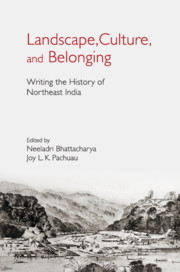Book contents
- Frontmatter
- Contents
- List of Figures
- Acknowledgements
- Introduction
- I Borders and Beyond
- II Surveys and Explorations
- III Ethnography, History, and the Politics of Representation
- IV Law, State, and Practices of Governance
- 8 Frontier Regime and Colonial Rule
- 9 The Law of Emptiness: Episodes from Lushai and Chin Hills (1890–98)
- 10 The Colonial State and the ‘Illegal’ Arms Trade along the North-East Frontier of India, 1860s to 1900s
- V Cultural Dialogues
- Notes on Contributors
- Index
8 - Frontier Regime and Colonial Rule
from IV - Law, State, and Practices of Governance
Published online by Cambridge University Press: 26 April 2019
- Frontmatter
- Contents
- List of Figures
- Acknowledgements
- Introduction
- I Borders and Beyond
- II Surveys and Explorations
- III Ethnography, History, and the Politics of Representation
- IV Law, State, and Practices of Governance
- 8 Frontier Regime and Colonial Rule
- 9 The Law of Emptiness: Episodes from Lushai and Chin Hills (1890–98)
- 10 The Colonial State and the ‘Illegal’ Arms Trade along the North-East Frontier of India, 1860s to 1900s
- V Cultural Dialogues
- Notes on Contributors
- Index
Summary
In the northeast frontier of the British Indian Empire temporary measures such as military operations (termed ‘punitive expeditions’) and the support of ‘princely states’ and chiefs of the ‘hill-tribes’ were used to control vast territories. These modes of control continued till the end of the colonial period in the form of ‘Excluded Areas’ and ‘Partially Excluded Areas’ and then transformed into the administrative structure of the nascent Indian state as well. The attempt here is to explore these colonial practices, which were other than that of direct administration. These practices continued for such a long time and were so widespread in scale that they can be termed as a ‘frontier regime’.
The term ‘North-East of India’ signifies various meanings. The use of the term as an administrative unit as well as to mean a peripheral, marginal zone throws up a lot of important and complex issues insofar as the ordering and controlling of spatial imaginations are concerned. The ‘authoritarian accent’, to use Sanjib Baruah's phrase, of the independent Indian state's attitude has been commonly understood to be a result of the Indian state's continuation of the British colonial policies and practices in the northeastern frontier of the British Indian Empire. Furthermore, the ascription of a certain territoriality as ‘frontier’ during the colonial period produces certain imageries and practices of the area. The British colonizers’ perception of an unfamiliar territoriality of the areas east of Bengal, inhabited by ‘wild’, ‘barbaric’, ‘warlike’, ‘savage’ populations in the colonial imagination, has become the frame of reference in post-colonial writings on South Asia, taking for granted the ‘naturalness’ of these areas as marginalized and on the periphery. By looking at these areas as frontiers, it assumes the presence of a centre elsewhere. This, in turn, obfuscates the politics and the historical nature of the production and the reproduction of territories. A historically informed interrogation of territories will bring to light the socially constructed and ideologically grounded nature of territorialities. To look at the making of the northeast frontier as historical practices and processes is to be aware that the different historical moments and initiatives changed the very register in which the territoriality of the Northeast came to be understood and practised.
- Type
- Chapter
- Information
- Landscape, Culture, and BelongingWriting the History of Northeast India, pp. 179 - 206Publisher: Cambridge University PressPrint publication year: 2019



